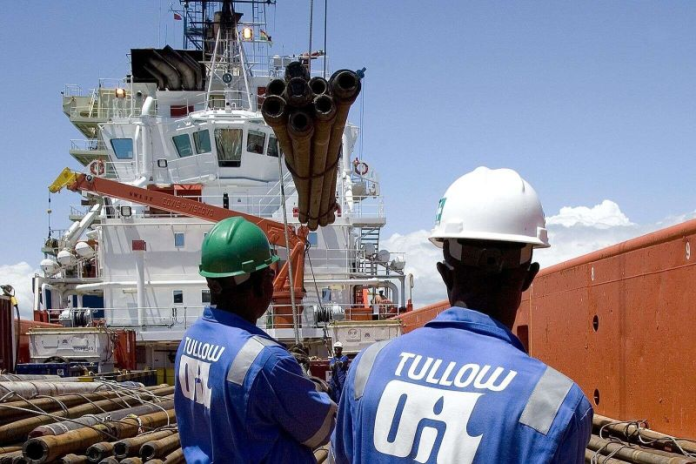
Tullow Oil plc is working to recover more than $200 million in outstanding payments from the Government of Ghana, a situation placing significant pressure on the London-listed company’s cash flow as it races to refinance its debt structure ahead of a May 2026 bond maturity. The receivables, which include approximately $100 million in gas payments, TEN development debt, and overdue cash calls, stood at over $200 million net to Tullow as of the end of October, according to the company’s November trading update.
The company expects 2025 free cash flow of around $300 million, assuming oil prices of $65 per barrel, but a substantial portion of that projection hinges on the timely recovery of government arrears. Chief Executive Officer Ian Perks, who joined the company in September, acknowledged the immediate financial pressures facing the oil producer, describing the establishment of long term sustainable financial footing as the company’s near term priority.
Tullow operates Ghana’s Jubilee and TEN oil fields, which have maintained steady production despite the payment delays. Jubilee oil production averaged about 61,000 barrels per day gross through October 2025, while TEN produced around 16,000 barrels per day gross, exceeding expectations through continued strong performance at the Ntomme and Enyenra areas. Both fields have benefitted from new wells drilled this year, helping to offset natural declines in older wells.
The company’s capital expenditure for 2025 remains approximately $185 million, with decommissioning costs of around $20 million. However, Tullow expects net debt of about $1.2 billion this year, up from its earlier forecast of $1.1 billion, reflecting the ongoing challenges posed by delayed government payments and natural production decline from existing wells.
The delayed payments come at a critical time for Tullow, which is engaged in debt refinancing discussions ahead of its May 2026 bond maturity. The company is in talks with bondholders, commodity traders and other funding sources to refinance its capital, while also exploring alternative options with certain creditors, including an amend and extend exercise given risks around its business performance and market conditions.
The financial pressure sent Tullow’s shares plummeting as much as 35% to 5.55 pence on November 21, hitting record lows and implying a market value of approximately 82 million pounds. The company’s combined credit risk stood at one, according to London Stock Exchange Group (LSEG) data, suggesting the producer is highly likely to default on its debt within the next year without successful refinancing.
Despite the financial uncertainty, Tullow has made operational progress in Ghana. Following the signing of a Memorandum of Understanding (MoU) with the Government of Ghana, good progress has been made to finalize the agreements required to implement licence extensions for Jubilee and TEN to the end of 2040. The agreement also includes provisions for payment security for gas and an updated Plan of Development for Jubilee, with a new Jubilee Gas Sales Agreement now in place confirming current gas prices through the end of the licences.
Overall Floating Production Storage and Offloading (FPSO) uptime at Jubilee and TEN has remained high, averaging 97% through October. The first of two planned 2025 production wells came onstream in July and has delivered strong performance, while drilling recommenced at Jubilee in early November with a second production well scheduled to come onstream around year end.
The partnership has approved a five well 2026 drill programme, comprising four committed wells including three producers and one water injector, plus one option well currently being progressed. Tullow has also acquired new 4D seismic data in the first quarter, which continues delivering informative reservoir visualization insights and supports well design optimization for the current campaign. An Ocean Bottom Node (OBN) seismic survey is underway and expected to complete around year end.
Tullow’s recovery of outstanding payments remains vital not only for the company’s liquidity but also for continued investment in Ghana’s oil sector, which provides significant revenue and employment opportunities for the West African nation. The company has stated it is engaging closely with Ghanaian authorities and exploring all options to resolve the payment situation, emphasizing the importance of timely settlements for operational stability and future growth.
The company recently completed asset divestments to strengthen its financial position, selling its entire working interest in Kenya for at least $120 million and its assets in Gabon for approximately $300 million net of taxes. These sales form part of Tullow’s broader strategy to reduce net debt and focus operations on its core producing assets in Ghana.
Looking ahead to 2026, Tullow projects group production of 34,000 to 42,000 barrels of oil equivalent per day based on an oil price assumption of $65 per barrel, reflecting the ongoing challenge of managing natural decline in existing wells while bringing new production online. The company is implementing cost base optimization savings of approximately $10 million, aimed at reducing 2025 annual net general and administrative costs to approximately $40 million, with targeted savings of approximately $50 million over the next three years compared to 2024 levels.
